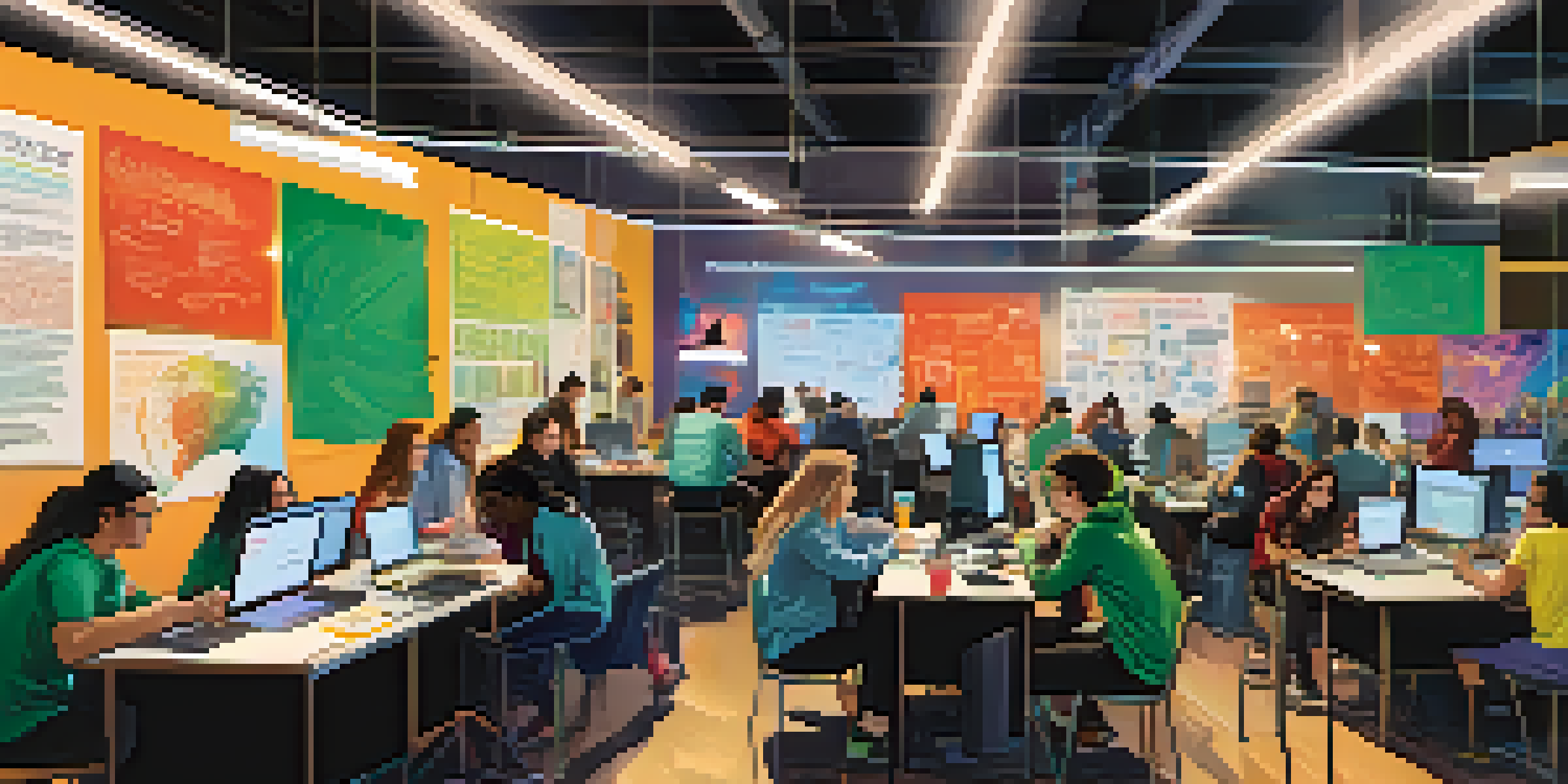Michigan State University: A Catalyst for Innovation

Introduction to Michigan State University's Innovation Ecosystem
Michigan State University (MSU) has long been recognized as a leading institution in fostering innovation. With a rich history dating back to 1855, MSU has evolved into a vibrant hub for creative thinking and problem-solving. The university's commitment to research and development not only benefits its students but also has a significant impact on the community and beyond.
Innovation distinguishes between a leader and a follower.
At the heart of MSU's innovation efforts is the synergy between academic disciplines, encouraging collaboration across various fields. This interdisciplinary approach allows students and faculty to tackle real-world challenges from multiple angles. Whether it's developing sustainable agricultural practices or advancing medical research, MSU is at the forefront of transformative ideas.
Moreover, the university's strategic partnerships with industry leaders and governmental organizations enhance its ability to drive innovation. These collaborations provide resources and support for groundbreaking projects, ensuring that MSU remains a catalyst for change in various sectors.
The Role of Research at MSU
Research is a cornerstone of Michigan State University's mission, serving as a catalyst for innovation. With millions of dollars in research funding each year, MSU attracts some of the brightest minds to explore pressing issues. From environmental sustainability to health sciences, MSU researchers are making strides that influence both local communities and global practices.

One notable initiative is the university's emphasis on agricultural research, which reflects its land-grant heritage. Through innovative techniques and technologies, MSU aims to enhance food security and promote sustainable farming practices. This dedication not only supports farmers but also contributes to the overall health of the planet.
MSU: A Hub for Innovation
Michigan State University fosters innovation through interdisciplinary collaboration and strategic partnerships, driving transformative ideas in various sectors.
Additionally, MSU is home to several research institutes and centers, such as the Institute for Cyber-Enabled Research. These centers focus on harnessing advanced technologies to address complex challenges, further solidifying MSU’s role as a leader in innovative research.
Student Involvement in Innovation
MSU encourages student participation in innovation through various programs and initiatives. Students are not just passive learners; they are active contributors to the university's research and development landscape. Through hands-on projects and internships, students gain invaluable experience while contributing to real-world solutions.
The best way to predict the future is to invent it.
The university hosts events like hackathons and innovation competitions, where students can showcase their ideas and collaborate with peers. These events foster a culture of creativity and entrepreneurship, allowing students to think outside the box and develop their problem-solving skills. It’s a vibrant atmosphere that inspires young minds to innovate.
Furthermore, MSU's commitment to entrepreneurship is evident through its dedicated resources, such as the MSU Hatch, an incubator that supports student startups. By providing mentorship and funding opportunities, MSU empowers students to take their innovative ideas from concept to reality.
Innovative Programs and Courses
Michigan State University offers a variety of innovative programs and courses designed to equip students with the skills needed for the future. The curriculum emphasizes critical thinking, creativity, and collaboration, preparing students to tackle the challenges of tomorrow. Programs are regularly updated to reflect the latest trends and technologies in various fields.
For instance, the College of Engineering offers cutting-edge courses in robotics, sustainable energy, and data analytics. These courses not only provide theoretical knowledge but also involve practical applications, allowing students to engage in hands-on learning experiences. Such exposure is crucial for developing a well-rounded understanding of their chosen disciplines.
Research Fuels Progress
Research at MSU serves as a catalyst for innovation, addressing pressing issues like sustainability and health through substantial funding and initiatives.
Moreover, interdisciplinary programs, such as the Environmental Studies and Sustainability major, encourage students to explore innovative solutions to environmental issues. This holistic approach fosters a generation of leaders equipped to make impactful changes in society.
Community Engagement and Innovation
Michigan State University extends its innovative spirit beyond campus by actively engaging with the community. Through outreach programs and partnerships, MSU collaborates with local organizations to address societal challenges. This commitment to community engagement helps bridge the gap between academia and the public, ensuring that research benefits those who need it most.
For example, the MSU Extension program provides resources and education in areas like agriculture, health, and community development. By sharing knowledge and expertise, MSU empowers local residents to implement innovative practices that enhance their quality of life. This reciprocal relationship enriches both the university and the community.
Additionally, MSU's commitment to diversity and inclusion fosters an environment where innovative ideas can flourish. By embracing different perspectives, the university cultivates a culture that values collaboration and creativity, ultimately benefiting the wider community.
Technology Transfer and Commercialization
One of the key ways MSU drives innovation is through technology transfer and commercialization initiatives. The university actively works to translate research findings into practical applications that can benefit society. This process not only enhances the impact of university research but also stimulates economic growth in the region.
MSU's Office of Technology Transfer plays a crucial role in facilitating partnerships between researchers and industry stakeholders. By identifying promising technologies and helping to secure patents, the office ensures that innovations reach the market effectively. This connection between academia and industry is vital for fostering a culture of innovation.
Empowering Students to Innovate
MSU actively involves students in innovation through hands-on projects, competitions, and resources like the MSU Hatch, nurturing the next generation of entrepreneurs.
Moreover, successful spin-off companies originating from MSU research demonstrate the tangible outcomes of these efforts. These ventures not only create jobs but also contribute to the local economy, showcasing the university's role as a driver of innovation and entrepreneurship.
Conclusion: The Future of Innovation at MSU
As we look to the future, Michigan State University continues to be a beacon of innovation. With its robust research programs, commitment to student engagement, and strong community ties, MSU is well-positioned to tackle the challenges of tomorrow. The university's focus on interdisciplinary collaboration ensures that diverse perspectives fuel creative solutions.
Furthermore, MSU's dedication to technology transfer and entrepreneurship will likely lead to even more groundbreaking discoveries and applications. As new technologies emerge and societal needs evolve, MSU remains committed to adapting and leading the way in innovation.

In essence, Michigan State University is not just an institution of higher learning; it is a catalyst for innovation that inspires change and drives progress. Its ongoing efforts will undoubtedly leave a lasting impact on the community, the economy, and the world at large.